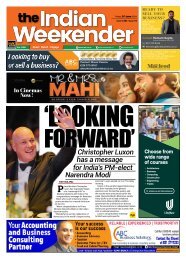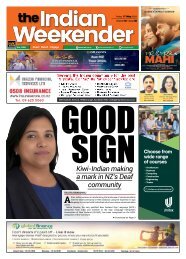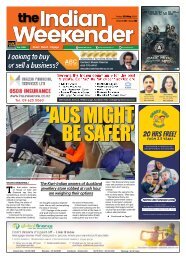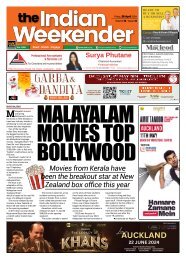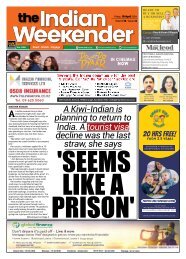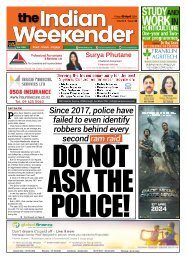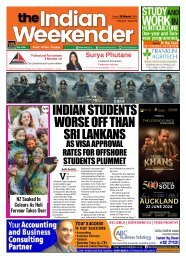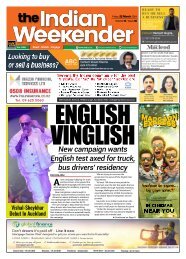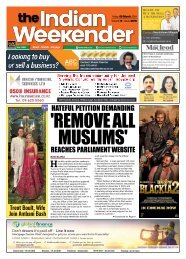The Indian Weekender, Friday 18 September 2020
It seems that the government’s understanding about the core issue of Indian marriage based partnership visa and INZ’s operational understanding of dealing with it are not aligned.
It seems that the government’s understanding about the core issue of Indian marriage based partnership visa and INZ’s operational understanding of dealing with it are not aligned.
- No tags were found...
Create successful ePaper yourself
Turn your PDF publications into a flip-book with our unique Google optimized e-Paper software.
10 NEW ZEALAND ELECTION CAMPAIGN <strong>2020</strong><br />
<strong>Friday</strong>, <strong>September</strong> 11, <strong>2020</strong> <strong>The</strong> <strong>Indian</strong> <strong>Weekender</strong><br />
HOW PARTNERSHIP VISA APPLICATIONS BASED ON INDIAN<br />
MARRIAGES CAN AGAIN FALL THROUGH THE CRACKS?<br />
SANDEEP SINGH<br />
<strong>The</strong> Minister of Immigration Kris Faafoi<br />
had announced on Monday, <strong>September</strong><br />
14, in an exclusive interview with<br />
the <strong>Indian</strong> <strong>Weekender</strong> that Immigration New<br />
Zealand will be restarting the processing of<br />
partnership visa applications so as to let them<br />
join their partners, who are NZ citizens and<br />
residents.<br />
INZ has confirmed that as of August 14, there<br />
were 2,258 offshore temporary relationshipbased<br />
visa applications on hand and 2,238<br />
offshore residence relationship-based visa<br />
applications on hand.<br />
So what does this mean for <strong>Indian</strong>-New<br />
Zealanders who are citizens and residents of<br />
this country and have chosen to marry and form<br />
a spousal relationship within their culture as per<br />
their traditions, which often means travelling<br />
overseas and getting married?<br />
Will they be able to reunite with their spouses<br />
as per the latest assurance by the Immigration<br />
Minister about the restarting of partnership visa<br />
processing?<br />
Unfortunately, No.<br />
At least as long as the current level of<br />
“disconnect” is allowed to persist between INZ<br />
and the government.<br />
What is the “disconnect”<br />
between Govt & INZ?<br />
Sadly, the current government’s<br />
understanding about the core problem of<br />
partnership visa for <strong>Indian</strong> marriages and INZ’s<br />
operational understanding of dealing with such<br />
visa applications are like two rail-tracks, which<br />
deceptively appears to be running side by side<br />
and appearing to be aligned – but in reality, they<br />
never meet together.<br />
INZ is restricted by the current immigration<br />
policy that only recognises traditional Pakeha/<br />
Eurocentric world-view of forming a spousal<br />
relationship where a couple has to live together<br />
before they become a couple.<br />
In <strong>Indian</strong> culture and many other major<br />
cultures of the orient, prior living together is<br />
not the necessary requirement of becoming a<br />
couple and is in fact actively discouraged, at<br />
least in a vast segment of such societies.<br />
<strong>The</strong>refore the majority of <strong>Indian</strong> marriages,<br />
especially where an <strong>Indian</strong>-New Zealander<br />
prefer to go overseas to marry within their own<br />
cultural settings, do not fulfil the requirement<br />
under current immigration law – which is<br />
clearly a biased, one size fit all, view of a<br />
spousal relationship.<br />
Immigration system’s deep<br />
rooted-bias against <strong>Indian</strong>marriages<br />
This is indeed a permanent deep-rooted bias<br />
towards partnerships based on traditional <strong>Indian</strong><br />
marriages, as they are never treated equally<br />
to a white man/woman trying to bring their<br />
partner from anywhere in Europe, Americas or<br />
anywhere else in the world.<br />
For several years, INZ’s frontline officers, in<br />
the absence of any suitable policy reflective of<br />
NZ’s changing demography, had been taking a<br />
compassionate view on their own, and issuing<br />
a “relationship-based General Visitor Visa”<br />
instead, so as to first allow such people to join<br />
their Kiwi-partners and live together and fulfil<br />
the requirements for partnership visas.<br />
Ever since this practice was abruptly<br />
disturbed by INZ’s Mumbai office in May 2019,<br />
the institutional-bias towards <strong>Indian</strong> marriages<br />
for the purpose of immigration continues to<br />
flare up time and again, putting those in <strong>Indian</strong>marriages<br />
in a disadvantage as compared to<br />
other ethnicities and cultural groups.<br />
Towards the latter half of 2019, there was<br />
an intense community resentment and media<br />
scrutiny, that propelled the then Immigration<br />
Minister to make some changes in “Culturally<br />
arranged marriage visa category,” in the hope<br />
that going forward most of the applications<br />
would be catered under that new category and<br />
the disadvantage towards <strong>Indian</strong> marriages<br />
would be removed.<br />
However, that hope has remained elusive, as<br />
not only there was any meaningful uptake from<br />
new applications under that new category, but<br />
also INZ had quietly reverted to their age-old<br />
business as usual approach of issuing “general<br />
visitor visa based on relationship.”<br />
How Kiwi-<strong>Indian</strong>s getting<br />
General Visitor Visa are<br />
disadvantaged<br />
That General Visitor Visa issued explicitly<br />
to partners of <strong>Indian</strong>-New Zealanders continue<br />
to remain disadvantaged as many such visa<br />
holders who have recently got their visas have<br />
been locked out of NZ borders after Covid<br />
related border closure.<br />
When the government had started to offer<br />
relief in June this year to allow partners of NZ<br />
citizens and residents who hold partnership<br />
visas to return to the country, all such <strong>Indian</strong>origin<br />
people who were partners of <strong>Indian</strong>-New<br />
Zealanders (citizens and residents) have not<br />
been granted such exceptions.<br />
<strong>The</strong> <strong>Indian</strong> <strong>Weekender</strong> has been at the<br />
forefront of raising voice for the <strong>Indian</strong>-New<br />
Zealanders who are experiencing forced<br />
separation simply because of “disconnect”<br />
between immigration department and the<br />
government and are being unfairly targeted<br />
purely because of their race and cultural<br />
practices.<br />
Surabhi Joshi is married to NZ resident Ankit<br />
Saptrishi and first applied partnership visa last<br />
year when she was advised by INZ that she<br />
will not fulfil “living together” requirement<br />
for partnership visa and was advised to file<br />
General Visitor Visa, which they applied and<br />
was approved.<br />
She had arrived in January <strong>2020</strong>, with only<br />
having to return on an emergency trip to visit<br />
her severely sick father before NZ borders were<br />
closed and has been locked out since then.<br />
Now, when all other Pakeha/European<br />
partners, who had partnership visas, were<br />
allowed exception to enter NZ and join their<br />
partners, but not Surabhi Joshi who had a<br />
General Visitor Visa.<br />
Amrutha Kishore, an <strong>Indian</strong>-New Zealander<br />
resident who got married to her long time beau<br />
who was working in Hongkong, is frustrated<br />
that her husband is not allowed an exception to<br />
enter NZ, simply because INZ had given him a<br />
General Visitor Visa.<br />
<strong>The</strong>re are hundreds and thousands of such<br />
examples, who have either received GVV<br />
recently or are currently in partnership visa<br />
queues that INZ will be restarting to process<br />
who will not be allowed to join their Kiwi<br />
partners despite the current Minister of<br />
Immigration’s recent announcement.<br />
To make it worse, INZ would not have<br />
readily available data about the number of<br />
applications emanating from India which first<br />
sought Partnership Visa, but were eventually<br />
granted General Visitor Visas to quantify the<br />
scale and the scope of the deep-rooted problem<br />
facing Kiwi-<strong>Indian</strong> community.<br />
Meanwhile, several industry stakeholders,<br />
including noted immigration lawyers have told<br />
the <strong>Indian</strong> <strong>Weekender</strong> that they have not seen<br />
any major movement in the culturally arranged<br />
marriage visa category with most of their<br />
clients still pursuing the path of applying for<br />
partnership visa and getting in return General<br />
Visitor Visa from INZ.<br />
Immigration Lawyer Alastair McClymont<br />
told the <strong>Indian</strong> <strong>Weekender</strong> that only 1% of his<br />
total clients of partnership visa were eligible for<br />
culturally arranged marriage visa category.<br />
Another Immigration lawyer Aron Martin<br />
also concurs saying that it was very rare that<br />
his clients qualified under the strict definition<br />
of culturally arranged marriage visa category.<br />
It is clear that soon, when INZ restarts<br />
processing of partnership visa applications all<br />
such applications based on <strong>Indian</strong> marriages<br />
will continue to fall through the cracks.





